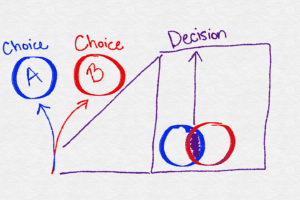The Death of Gods
“Can Gods die?”
My more educated friends will likely recognize the title of this entry as if I were making reference to Nietzschean philosophy and the “Death of God.” I am doing no such thing.
Let me explain.
Since we are on that page, I will say that to some extent I do agree with Dawkins’ comment that “We are all atheists about most of the gods that humanity has ever believed in. Some of us just go one god further.”
Again, let me explain.
?Dying⚫
I have to admit that I have a weird psychological relationship with death.


I don’t know if it is because I spent my childhood in Mexico and we have the Day of the Dead (meaning we somehow celebrate death). Or maybe it was because as a young adult in Kansas, I woke up one September morning to realize that my grandpa in Mexico had “finally” died. My own dad had not seen his dad for 7 years thanks to bullshit political reasons, and now they would never see each other again in this life. Ever.
So that morning I felt a double-whammy of death: my grandpa dying, and the realization that I too, would some day experience what my dad was thinking/feeling right now as I lay next to him. However, if I am being excruciatingly honest with myself and with you, I’m pretty sure my relationship with death was finally chiseled out by the following story based on real life events.
Many know this, but thanks to my relationship with my parents, I’ve always wanted to be a dad more than anything else. Many of my closest friends also know that at some point in my life, I could have actually become a father. Not figuratively, literally. Yet I never even saw an ultrasound. Who would this child have been? Would it be male or female? Would s/he have more pigmented skin like his/her father or a lighter tone like her/his mother? What sort of things would we live through together? And for how long?
The answer to all of those questions is simple: nothingness.
All of those questions, all of that potential, and all of that life is not only an idea, but objectively a dead one. No matter how you feel about it, or how I felt about it at the time, this is just a cold, hard fact of life that can never be changed. No God will ever change that (believe me, I tried). Yes, I will probably have another child at some point. And yes, the situation is fine and my life is perhaps better this way, but this one human is gone forever. Unless you have lost a parent or a child, I am not sure you can fully grasp the gravity of the situation, and the point here is that I can’t even have a memory of what I lost: it is an idea that could have been, yet never will be. Period.
So you see, my relationship with death is odd because I certainly don’t want to die (like most creatures on this Earth), but life has taught me that everything does, even ideas.
?Divinity⚪
So, religion.
If you saw the headline thinking I would actually go into the topic of religion itself, and I would make enemies by choosing a specific religion or god to side with, then you probably don’t know me well at all. (If you read it thinking “O lord, let’s hope he thought this one through instead of going on a massive rant” then thank God texts can be thought-through more than speech, amIrite?!)
You will never get a true “short version” or a “straight answer” from me on complex topics. At that point people just want to argue/talk so I will simply turn that on them. Let’s be real, religion is the hardest and perhaps most controversial and convoluted question that humanity has ever asked itself, and you expect me, a professionally philosophical overthinker prone to going on emotional rants, to give you the ‘short.version’?


The point is that no matter what God you believe in, how long ago your religion started, or how many people agree with you, the fact is that in your human mind God can only be an idea. Maybe it/he/she is the perfect idea. Maybe it it/he/she is indeed omnipotent, omniscient, and omnipresent by manifesting itself in every atom of the universe. But if you think y/our human brain is capable of grasping all of that as anything more than an imperfect idea, well… please refer to the gif above… I don’t claim to know better, but I will shatter your idea of God to its last Planck if you want to properly debate and you’re ready to listen. So don’t impose your Gods on me because you two will be the only casualties.
As you can hopefully tell from the section above, however, even ideas can die (and many die all the time). Believe me, death is indeed a terrifying prospect, but you know why that is? Because we have no idea what happens afterwards (i.e. there’s not even an idea to represent such nothingness). To fully accept the ultimate death would mean to let go of the idea that is “I” and embrace a concept of nothingness which is impossible to even grasp. Arguably the very core purpose of any religion is to explain both creation and death. As a human, the idea/perception that is “I” wonders where I came from and wants to believe that it will go on after my body ceases to exist. So if you want my “neutral” answer to the topic of religion, I would say this:
Religion is an idea of creation to balance out a concept of nothingness that would not only destroy everything, but it would ensure nothing ever existed. So religion, just like life itself, is a good thing… unless it turns on itself and leads to destruction, which is its very antithesis.
?Re-Birth? Evolution??
If you read between the lines of what I just said, or are good at logical thinking, you can probably see the implications of my comment above. When religion leads to destruction, it must go. Surely some passionately religious bloke reading this will be tempted to argue that this is why their religion is better than others. Honestly, I/We don’t have time for this, so let me get to the point: by trying to convert others into your religion, you are thereby trying to destroy theirs, hence it is your religion that must go, not theirs. Period. And if your human ego wants to express insecurities by saying something along the lines of “but they…” the rest of us adults will just have to yawn and say “ok, Boomer”.
(Wow, I condescendingly managed to call someone both a child and a grampa in half a sentence, as if those were bad things in an article where I lament the death of both a grandpa and a child I loved… can we at least get a metaphorical applause for that ultimate paradox, please?)
Again, I have admittedly taken no stance, chosen no sides, and essentially said “nothing” about religion. So I guess I’m getting pretty good at this nothingness thing and I might be ready to embrace death too (joking, chill, I’m patiently waiting to be killed rather than looking for a ticket out). If you take away anything from this essay, let it be this…
At the end of Nietszche’s famous phrase that “God is dead” he states “Must we ourselves not become gods simply to appear worthy of it?” In other words, regardless of whether your or their God does or did exist, if we assume that all our Gods can and do die, does that liberate us from morality and responsibility, or does it give us the opportunity to properly rise to the occasion and take the game-winning shot after coming from the bench? Of course no human could ever become God, but why bother believing in Gods that you don’t want to emulate?
I’m no Einstein for saying any of this, but the Gods that we believe in, and the stories we tell ourselves and each other, are the ones that shape us. To just about every Millennial reading this, now that I have gone on a long rant and you know the context of what I’m saying, let me summarize the entire thing into a single image and caption:


If I had given you this image as a “short version” rather than the full article, you probably would have no idea what I just said and you might simply assume what I meant… #stroryOfMyLife



